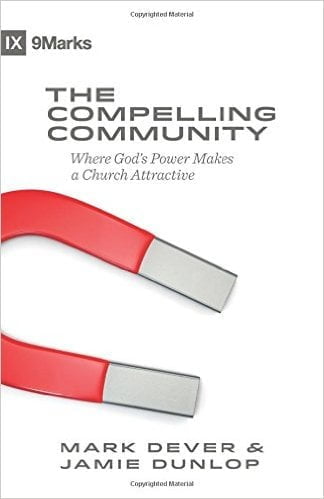⏱️ Estimated Reading Time: 4 min read
I have yet to read a book put out by the 9Marks initiative that I didn’t like. I’m so thankful for Mark Dever and the other wise and helpful pastors he’s gotten on board to help us learn about building healthy churches. They have been essential resources for pastors and church leaders, and The Compelling Community continues down that path. When I chose to review this book, I was reading mostly because a part of my role in serving at the church plant I’m working with is evaluating what we are doing to build community in our church, not only as a church family but as a church that seeks lost people. Needless to say, a book with such a title was…compelling! Jamie Dunlop, basically piggy-backing off of Dever’s ecclesiology, does a great job teaching us the depth and breadth of what “Biblical community” really is.
There are some major bullet points I took away from this book. I think it would be helpful to provide an aerial view into the book through some of these main headings:
Gospel-Revealing Community Is Not A Quick Fix.
Our tendency in reading church leadership books is that we use them to be instant catalysts in our church bodies, and, in turn, expect to see results immediately. But what Dunlop labors to show us is that building biblical community in and out of the Church is not going to happen overnight, nor will it likely happen within a few months. It’s a slow-moving process, but years down the road it’s so rewarding. Are we committed enough to building community to the point where we’ll work hard for results we may never see in the Church? This really convicted me personally. Instead of being a “gospel-plus” community where we focus on marketing instead of relationships, the “gospel-revealing” community does not meet our immediate needs, and that’s okay.
Are Our Relationships Formed By The Gospel, Or By Affinity?
One of Dunlop’s biggest ideas is that we should have relationships that are only possible by the unifying and mysterious power of the gospel. What we find in evangelicalism today are “black churches,” “blue-collar white-family churches,” “cowboy churches,” “contemporary churches,” and so forth. Our church bodies are becoming based on likeness, not the transformative power of the gospel. Even in churches without a niche market, we see these affinity-based relationships taking over our small groups and segmentation of church services. Dunlop is clear — what should make the Church so unique is that it brings together a whole melting pot full of different races, classes, ages, and styles and becomes the foundation for our unified worship of God.
People are Eternal; Therefore, Relationships Are Essential.
One of my favorite chapters from the book is Chapter 7: “Build a Culture of Spiritually Intentional Relationships.” In this chapter Dunlop outlines practical and insightful reasons for being humble, hospitable servants in relationship with others. Here he expands our view of biblical hospitality, church membership, and the necessities of personal example, preaching, prayer, and patience in building these relationships. At the core of this chapter, Dunlop makes a simple observation: people are eternal. This fact alone should drive us to pursue eternal people with eternal perspective and eternal patience!
This book is really helpful for those looking for the practicality of building community, but also helps us pump the brakes a little and realize this isn’t a one-week process. The Compelling Community gets our engine started for running this important race, but helps us remember, only the gospel can transform in such mighty ways, and we’d do good to let Christ steer. Thanks again to the 9Marks team, Jamie Dunlop, and Mark Dever for a helpful resource.



